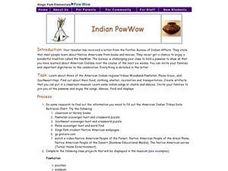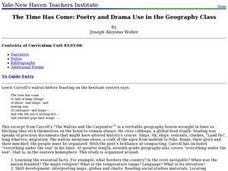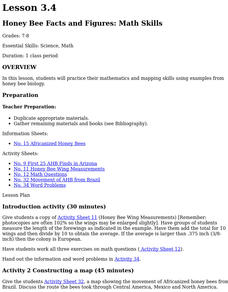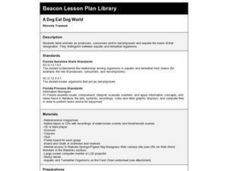Curated OER
Simple Keys and Nutrition
Third graders identify descriptive questions as a method for distinguishing objects and for identifying labels for objects and categorizing objects. They participate in a student grouping activity, then using pictures of different types...
Curated OER
Mixing Colors
Students understand why we see various colors. In this mixing colors lesson, students experiment with different food coloring to explore how colors are made. Students record on a data sheet the colors they see.
Curated OER
Nutrition: It's In Your Hands
Fourth graders use this lesson to focus on their health, nutrition and the state of the environment. In groups, they examine the various types of land, water and air pollutants and compare and contrast a food chain with and without a...
Curated OER
Photosynthesis
In this biology worksheet, students explain where the energy of food originally came from. Then the explain one of the principal chemical compounds that living things use to store energy. Students also describe how ATP and ADP differ and...
Curated OER
Indian PowWow
Learners identify three different American Indian regions and tribes, their food, clothing, shelter, recreation, and transportation. Students create artifacts that can be placed in a museum. Learners sing songs, chants, and dance. ...
Curated OER
Trash Bashing
Students define trash, garbage, or solid waste, discuss ways of disposing of trash, list examples of biodegradable materials, and have trash relay race in order to sort trash into appropriate containers labeled biodegradable, reusable,...
Curated OER
The Time Has Come: Poetry and Drama Use in the Geography Class
Students use drama and poetry in their Geography class. In groups, they role play an interviewer or the interviewee in various plays that were presented to them. In their role, they must locate and label where the countries mentioned...
Curated OER
Action and Linking Verbs
In this recognizing action verbs and linking verbs in sentences worksheet, learners read statements, identify the verbs, and label them either action or linking verbs. Students write 15 answers.
Curated OER
Seed Socks
Students explore how seeds travel. In this seed disbursement instructional activity, students head outside in their bare socks. Students walk around then before going inside they take the socks off and examine what their socks picked up....
Curated OER
No Title
First graders listen as the book, "Tops and Bottoms," by Janet Stevens is read to them and then participate in a discussion about foods and where they grow. They draw a picture of a plant labeling the major parts of it sequential order.
Curated OER
Learning About Ratios: A Sandwich Study
Students gain a concrete introduction to the concept of ratios. They demonstrate the ability to create ratios using peanut butter and jelly. They, in groups, construct 6 different sandwiches using different amounts of each food.
Curated OER
All About the Animals
Whose footprints are those? After reading Janet Halfmann's book, Little Skink's Tail, young scholars use footprints to determine where on a gridded map certain animals have been spotted. They use the map to answer 3 questions, one...
Dick Blick Art Materials
“Gawu” — African-influenced Tapestry
Here's a great way to combine environmental science with art. Kids use recycled materials to create their own Gawu, a tapestry made of discards. Although designed for special education classrooms, the activity is sure to engage all...
California Polytechnic State University
Australian Geography Unit
At the heart of this resource is a beautifully detailed PowerPoint presentation (provided in PDF form) on the overall physical geography of Australia, basic facts about the country, Aboriginal history, and Australia culture and lifestyle.
Achieve
Ground Beef
Ever wonder how a butcher creates the different types of ground beef? Young mathematicians explore the methods butchers use to create their desired ground beef quality. Given a combination of two types of meat with varying leanness,...
Northern Ireland Curriculum
Self Concept
It may not be possible to have control over all aspects of life, but through the activities and discussions in this lesson class members learn different ways to cope with those areas over which they have little or no control.
Curated OER
Where in the World?
Students evaluate botany by participating in a class discussion. In this agriculture instructional activity, students identify the importance of knowing where food comes from and they discuss what their breakfast consisted of and where...
Curated OER
Understanding Portion Sizes
Students analyze portion sizes in a healthy diet. In this portion sizes lesson, students complete a food group choices worksheet and identify the correct portion of food. Students work in groups to teach the unit to elementary students....
Curated OER
What's In Your Grocery Bag?
Students explore the global implications of consumer decisions when purchasing groceries. They examine labels of food products and discuss the wording on the labels. They calculate food miles of how far each ingredient in foods has...
Curated OER
Lunchroom Trash
Students explore the amount of waste produced by humans. In this ecology lesson, students predict which lunch bag and its contents will produce the most waste. Leftover material is examined, amounts are recorded, and a bar graph is...
Curated OER
Honey Bee Facts And Figures: Math Skills
Learners practice their mathematics and mapping skills using examples from honey bee biology. Discuss why the colonies were found in this pattern. They examine food and water in the area, and how many humans live in the area where...
Curated OER
A Dog Eat Dog World
Fourth graders distinguish between acquatic and terrestrial organisms. They label animals as producers, consumers, and/or decomposers.
Curated OER
Hazardous Products Substitutes
Students investigate toxic substances. In this health lesson, students identify warning labels on common household cleaners and create a "less toxic" cleaning recipe book. Students recite a pledge to try a less toxic substitute at home.
Curated OER
Showing Nature's Way-Plant Development and the Plant Parts We Eat
Students explore plant life. In this science lesson plan, students demonstrate and record the stages of plant growth and categorize food plants by identifying the edible part.






